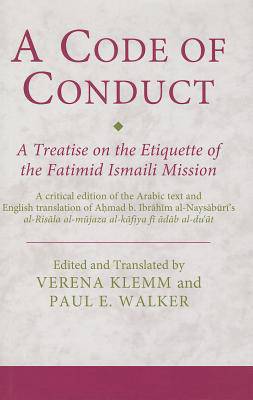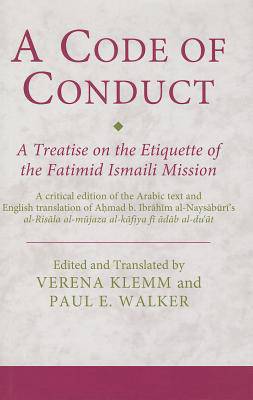
- Retrait gratuit dans votre magasin Club
- 7.000.000 titres dans notre catalogue
- Payer en toute sécurité
- Toujours un magasin près de chez vous
- Retrait gratuit dans votre magasin Club
- 7.000.0000 titres dans notre catalogue
- Payer en toute sécurité
- Toujours un magasin près de chez vous
A Code of Conduct
A Treatise on the Etiquette of the Fatimid Ismaili Mission
93,45 €
+ 186 points
Description
I.B. Tauris in association with the Institute of Ismaili Studies
The Risala al-mujaza al-kafiya fi adab al-du'at (A Brief and Concise Treatise on the Code of Conduct for the Da'is) constitutes the only extant work in Ismaili literature that deals with specific practical aspects of the Ismaili da1wa, an appeal and encouragement to the faith.
Written by the Fatimid author Ahmad b. Ibrahim al-Naysaburi (5th/11th century), it represents a normative guide for the Ismaili da'is, who functioned as the religious agents and 'summoners' responsible for the leadership, instruction and spiritual and social welfare of the Ismaili community.
Al-Naysaburi's enumeration of the da'is' ideal traits and attributes in the Risala al-mujaza belongs to the wider genre of 'professional adab' literature that exclusively addresses groups belonging to certain occupations and instructs them in specific ethical principles and codes of conduct, and which is prevalent in classical Islamic culture. It may also be located in the even older tradition of the Mirror of Princes literature, which dates back to pre-Islamic Persia, and which promoted the ideal practice of rulership. Indeed, many of the characteristics of the da'i listed in the Risala are consistent with the topoi in the Mirror of Princes literature as it relates to the ruler, namely the virtues of piety, chastity, uprightness, mercy, forgiveness, humility and generosity. In this regard, the communal functions of a da'i also mirror the duties traditionally ascribed to a responsible ruler - that he has to maintain the community, protect the weak and fight and punish crime, corruption and social disintegration - but with the one key distinction that they are, in this instance, always elaborated within the context of the Ismaili da'wa. The present work constitutes a critical edition and translation of the Risala al-mujaza al-kafiya fi adab al-du'at. Al- Naysaburi's treatise is a fascinating testimony to the wide network of a class of individuals charged with proclaiming the da'wat al-?aqq ('call to truth') over various frames of time and space. It is thus a valuable resource for students and scholars interested in medieval Islamic literature more generally and the structure and workings of the Fatimid da'wa in particular.
The Risala al-mujaza al-kafiya fi adab al-du'at (A Brief and Concise Treatise on the Code of Conduct for the Da'is) constitutes the only extant work in Ismaili literature that deals with specific practical aspects of the Ismaili da1wa, an appeal and encouragement to the faith.
Written by the Fatimid author Ahmad b. Ibrahim al-Naysaburi (5th/11th century), it represents a normative guide for the Ismaili da'is, who functioned as the religious agents and 'summoners' responsible for the leadership, instruction and spiritual and social welfare of the Ismaili community.
Al-Naysaburi's enumeration of the da'is' ideal traits and attributes in the Risala al-mujaza belongs to the wider genre of 'professional adab' literature that exclusively addresses groups belonging to certain occupations and instructs them in specific ethical principles and codes of conduct, and which is prevalent in classical Islamic culture. It may also be located in the even older tradition of the Mirror of Princes literature, which dates back to pre-Islamic Persia, and which promoted the ideal practice of rulership. Indeed, many of the characteristics of the da'i listed in the Risala are consistent with the topoi in the Mirror of Princes literature as it relates to the ruler, namely the virtues of piety, chastity, uprightness, mercy, forgiveness, humility and generosity. In this regard, the communal functions of a da'i also mirror the duties traditionally ascribed to a responsible ruler - that he has to maintain the community, protect the weak and fight and punish crime, corruption and social disintegration - but with the one key distinction that they are, in this instance, always elaborated within the context of the Ismaili da'wa. The present work constitutes a critical edition and translation of the Risala al-mujaza al-kafiya fi adab al-du'at. Al- Naysaburi's treatise is a fascinating testimony to the wide network of a class of individuals charged with proclaiming the da'wat al-?aqq ('call to truth') over various frames of time and space. It is thus a valuable resource for students and scholars interested in medieval Islamic literature more generally and the structure and workings of the Fatimid da'wa in particular.
Spécifications
Parties prenantes
- Traducteur(s):
- Editeur:
Contenu
- Nombre de pages :
- 176
- Langue:
- Anglais
- Collection :
Caractéristiques
- EAN:
- 9781780761268
- Date de parution :
- 08-05-12
- Format:
- Livre relié
- Format numérique:
- Genaaid
- Dimensions :
- 145 mm x 218 mm
- Poids :
- 399 g

Les avis
Nous publions uniquement les avis qui respectent les conditions requises. Consultez nos conditions pour les avis.





